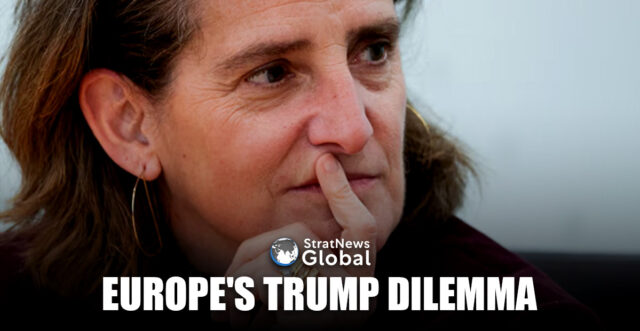U.S. President Donald Trump has upended the “trustful relationship” between the United States and Europe, and Brussels should focus on providing the predictability and stability that is lacking in Washington, the EU’s competition chief has said.
Teresa Ribera, the second most powerful official at the European Commission after President Ursula von der Leyen, told Reuters that while Europe needs to negotiate with the White House and hear its concerns on trade, it should not be pushed into making changes to laws that have been approved by lawmakers.
EU Hardens Stance
“We need to stick to our strengths and principles,” she said in an interview in London on Monday, criticising Trump’s transactional approach to politics.
“We need to be flexible but we cannot transact on human rights nor are we going to transact on the unity of Europe, and we are not going to transact on democracy and values.”
Trump and other members of his government have criticised the European Union for having too many rules and characterised fines imposed on U.S. tech companies by the EU as a form of “taxation”.
Last week U.S. Vice President JD Vance said European Union “commissars” were suppressing free speech due to clauses in the bloc’s Digital Services Act that gives the EU powers in urgent situations to temporarily restrict access to an online platform or search engine.
“If there is a problem, a point of concern, please explain that. It is not like bullying – that you can expect to enter the negotiating table. That doesn’t make sense,” Ribera said.
Ribera has the power to approve or veto multi-billion euro mergers and also slap hefty fines on companies seeking to bolster their market power by throttling smaller rivals. She also oversees the EU’s green agenda and is tasked with keeping it on track to meet the bloc’s 2030 climate goals.
Tensions are running high between Washington and Brussels after Trump’s decision to impose 25% tariffs on steel and aluminium from March 12; reciprocal tariffs from April; and separate tariffs on cars, pharmaceuticals and semiconductor chips.
Ribera pointed to the lack of certainty and predictability across the Atlantic compared with Europe, saying that was not what business wanted in the long term.
“They want an ecosystem and a legal framework that provides certainty, stability and predictability and I wonder why we do not hear this question being raised the other way round towards Trump’s administration.
“I don’t see any predictability, stability or affordability in these announcements, this is a little bit shocking.”
The EU Commission, which coordinates trade policy for the 27-nation bloc, said last week it would react “firmly and immediately” against tariff increases threatened by Trump.
European Trade Commissioner Maros Sefcovic was due to travel to Washington on Monday for meetings with U.S. counterparts.
Apple, Meta Decisions
The White House’s frequent threats of various shapes and sizes have unsettled executives, investors and consumers, leaving them unclear whether the latest salvos will come to pass, or whether exemptions could be carved out for companies that lobby Trump.
Last week, Ford (F.N)CEO Jim Farley said Trump’s trade moves have so far added “a lot of cost and a lot of chaos” to American business.
Ribera said the EU is ready to issue decisions next month on whether Apple (AAPL.O) and Meta Platforms (META.O) have complied with landmark rules reining in their power.
Both companies have been in the EU’s crosshairs since March last year and could face hefty fines of up to 10% of their global annual turnover if found to have breached the Digital Markets Act.
There had been speculation that Ribera could delay the decisions following criticism from Trump and Meta Chief Executive Mark Zuckerberg of recent EU regulations which Big Tech says unfairly target them with hefty fines.
Asked whether she would issue decisions on the two companies in March, Ribera said: “Yes, next month.”
“There will be decisions along the lines that have been discussed with the companies, developed and based on evidence,” she said.
The Commission is also investigating whether Elon Musk’s social media platform X has breached the bloc’s rules against illegal content. Ribera said Musk’s role in the U.S. administration will not be a factor in the EU’s decision.
“It is not a question of who is the owner of the company that could be in one of these processes,” she said.
(With inputs from Reuters)





